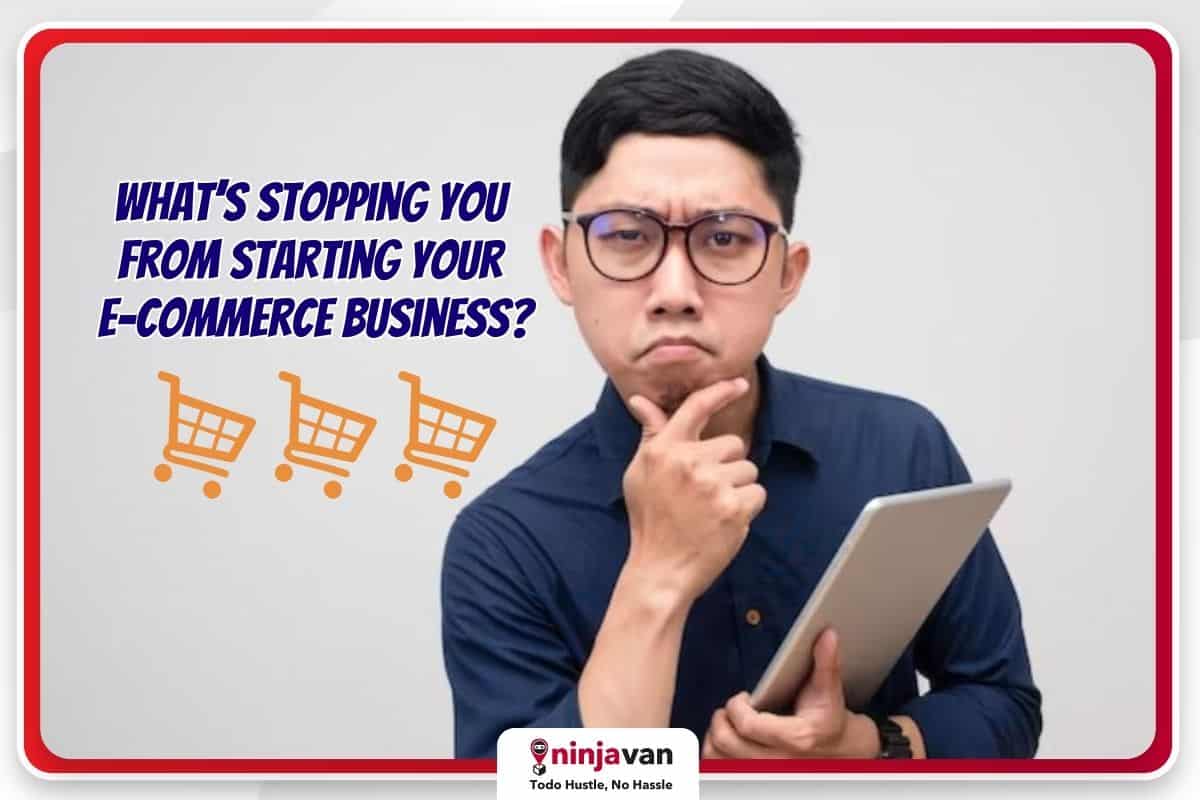Starting a business used to require a big capital, and an even bigger amount to keep it running. These days, you can run an ecommerce business from your home office, with nothing but your phone, laptop and the internet!
If starting an ecommerce business doesn’t take as much time, money and energy as it used to, why haven’t you started yours? For example, check out these 7 Online Business Ideas You Can Start with PH100K.
Why it’s good to start an ecommerce business
Here are some quick motivations if you need a little nudge to get your business idea going.
1. The internet makes life easier! With the internet, it’s easier to reach out and engage with customers. All you’ll need is a good business idea, a selling platform and social media savvy.
2. You dictate your work-life balance. Being your own boss means you get to decide when to work and how to achieve your milestones. Should you want to hustle by the beach, you’re be free to do so.

3. You get to create solutions. Starting a business puts you in control. You can create products that solve customer pain-points. Your experiences as a consumer are your best leverage to come up with the next best idea.
4. Build your legacy. Deep dive into what you’re passionate about and turn it into a business. A business is a way to create something that will outlive you, something you can pass on to or inspire the next generation.
5. Financial independence. Being in control of your revenue stream makes you less likely to live by the paycheck. You’ll hustle until you’ve reached financial independence or even financial freedom!
10 big reasons to start an ecommerce business today
Let’s get to the business part. Starting an ecommerce business can be a lucrative venture, and there are 10 compelling reasons to consider launching one today.

1. Wider reach
Ecommerce allows you to reach customers nationwide and even worldwide, breaking down geographical barriers and expanding your potential customer base.
More customers mean more sales, and a lot faster to grow your business!
2. Low overhead costs and scalability
Compared to traditional brick-and-mortar businesses, ecommerce requires lower initial investment and ongoing operational costs. You can start small and scale as your business grows.
As your business grows, it’s relatively easy to scale up by adding more products, expanding into new markets, or improving your website’s features and functionality. The investment you need is still much lower than when running a traditional business.
3. 24/7 availability
Your online store operates 24/7, enabling customers to shop at their convenience, which can lead to increased sales and revenue. Just make sure you have a chatbot in place for inquiries or to make the shopping journey easier for customers.
Also read: Using Chatbots to Drive Sales to Your Ecommerce Business
4. Diverse product range
You can sell a wide range of products, from physical goods to digital downloads, services, and more, providing flexibility in your business offerings. Your online shop shouldn’t be limited to a few types of products, too. You can mix items or sell whichever is trending or profitable at a certain time.
In addition to product sales, you can explore various revenue streams, such as affiliate marketing, subscription models and dropshipping to diversify your income sources.
#NinjaTip: Are you looking to buy and ship products from China? Ninja Direct gives you safe, reliable, and hassle-free end-to-end sourcing and procurement services from China to the Philippines. Talk to our experts today!
5. Targeted marketing
Ecommerce platforms offer robust marketing tools that allow you to target specific demographics and tailor your marketing efforts to reach the right audience effectively.
On your end, you can utilize your social media accounts and other online tools to market, offer promotions and drive customers to your online shop.
Check out these 7 Essential Online Business Tools for Ecommerce.
6. Data-driven decision making
No more guessing what works and what doesn’t. With the wealth of data available in ecommerce and other analytics tools, you can gain insights and analyze customer behavior, preferences and sales patterns to make informed business decisions.
You can also analyze website performance, and marketing campaigns, enabling you to continually refine and improve your business strategies.

7. Easy to use platforms
It’s easier than ever to start an online store with user-friendly platforms like Shopify, WooCommerce, and Wix, even if you have limited technical expertise.
Don’t worry, we’ve got them all here: 7 Essential Online Business Tools for Ecommerce.
8. Niche opportunities
Building an online brand allows you to target niche markets, catering to specific customer interests or needs, which can result in a more loyal customer base. It’s easier to create content and strategies that would engage followers and build a community around your brand.
9. Easier supply chain management
Modern tools and software make it easier to manage your supply chain, inventory, and fulfillment, reducing the chances of stockouts and overstock situations.
#Ninja Tip: For a growing ecommerce business, it may be best to outsource your supply chain management and fulfillment process. So you can focus more on growing your brand and increasing sales.
10. Reduced environmental impact
With the potential to eliminate the need for a physical storefront and reduce transportation-related emissions, ecommerce can be a more environmentally-friendly business model.
For a more sustainable method, you can also work with Ninja Van to use your own packaging when shipping your parcels. This eliminates plastic use and allows you to customize your packaging. Simply get in touch with us to learn how.
The 4Ps of marketing: promoting your ecommerce business
First, what are the 4Ps of marketing? It simply refers to:
- Product or the goods or services you’re offering your customers.
- Price or the amount of money that customers have to pay for a product or service.
- Place, these are the channels through which your product or service is made available to customers.
- Promotions referring to how you promote your product to potential customers.
It’s a set of marketing tools used to pursue a company’s marketing goals based on its target market. While it’s an already established concept, the 4Ps of marketing can work together to create an effective strategy for your ecommerce. Here’s how:
Product: the core of the marketing mix

In ecommerce, the product mix can be broader and more diverse than in traditional retail stores. Ecommerce businesses need to determine what products will attract online shoppers, the features of these products, and how they will be presented to customers in the online space.
While store shoppers can see and feel the actual products, online shoppers can’t. That’s why creating product pages that contain all the important information is crucial to making a sale.
Here’s how to Design an Effective Product Page that Converts.
Price: an important element (obviously)

of your entire operations.
Ecommerce pricing may be different from traditional pricing strategies. Companies need to consider factors such as shipping costs, taxes and the cost of returns. They may also use dynamic pricing based on market demand and consumer behavior (meaning what’s trending).
As ecommerce is a much more competitive marketplace, online sellers tend to drop the pricing of their products. But customers are smarter than that. If they think your product is worth its cost, even if it’s pricier than other brands, they will choose you.
That said, it will help to make your pricing attractive by offering repeat buyer discounts, free shipping or free items. This will also help build a community of loyal followers around your brand.
Place: making your product available to customers

can easily discover your brand.
In ecommerce, the place element refers to the online channels through which products are made available to customers. This includes the company’s own website, third-party ecommerce platforms and social media.
Companies need to ensure that their online channels are optimized for easy navigation and have a secure payment gateway.
When searching online, customers mostly look for products rather than brands. For example, they will go to Google and search for ‘organic face moisturizer’. As an organic beauty brand, you need to appear on the first page of the search results to have a chance at catching that customer.
Therefore, learning basic search engine optimation (SEO) is a must for every ecommerce business. Or you can hire an agency to do it for you if you have the budget. You can start with these Ecommerce SEO Best Practices.
Promotion: creating awareness around your product

Promotion in ecommerce involves the digital marketing channels used to reach customers. This includes SEO, email marketing, social media marketing and display advertising. Creating a digital marketing strategy will help ensure that your brand message or information about your products will reach online shoppers.
But reach is not enough, your strategy should be engaging to make them stop, check and buy. An online user’s attention span lies somewhere between 3-5 seconds — do you ever notice how many Facebook and YouTube ads only last that long?
In that short amount of time, your online ads should attract attention and, at the same time, make the pitch — meaning tell them about your product and why they need it.
Begin, learn and improve
Your ecommerce business faces much competition online, so it’s important to be both smart and strategic about how you market your products.

It’s also important to know that ecommerce is continually evolving, offering opportunities to experiment with new technologies and sales channels to stay competitive and meet customer demands. Meaning you have more room to improve and evolve as a business owner.
But even if your first business venture doesn’t succeed right away, the experience you get from starting and sustaining it, makes you more equipped for the next one. Yes, sometimes you win and other times you learn, but what matters most is you begin.
Kaya good luck sa iyong entrepreneur journey, ka-Ninja! And if you need a courier partner na todo hustle para sa ‘yo, sign up na with Ninja Van!
More useful tips for ecommerce success:
4 Ways to Grow Your Ecommerce Business
A Complete Guide to Social Media Marketing in The Philippines
8 Government Programs for Micro-Businesses and SMEs






